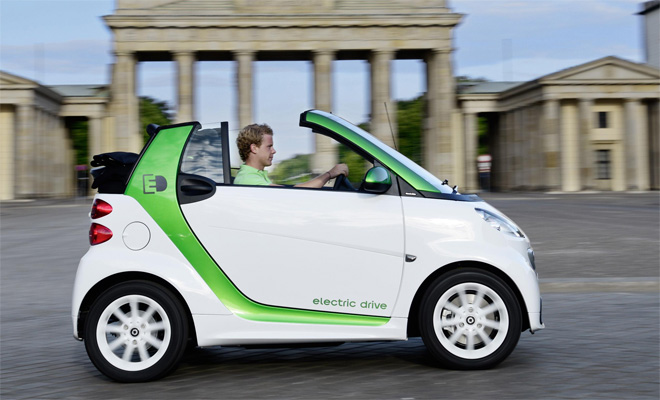
When I tested the Smart ForTwo Electric Drive back in October, the UK price was still a bit of a mystery. In its home market, the little German electric car costs €23,680 (about £19,700 at today’s exchange rate) so with a little help from the government’s Plug-in Car Grant I hoped a UK retail price of under £15,000 might be possible.
That was optimistic, as it turns out. Today Smart has confirmed that UK buyers will need to find just a little bit more – at least £15,395 – to silently drive away in a box-fresh ED. Alternatively, there is the option to pay for the car and lease its battery, by choosing a Sale&Care package that costs from £12,275 up front plus £55 per month thereafter.
Even with the lease package, buyers will still need to find their own electric car insurance, of course, but at least charging the battery should be pleasantly cheap.

The soft-top Cabrio edition of the car, meanwhile, will cost from £16,895 outright – a £1,500 premium over the tin-topped car – or £13,400 plus £55 each month – which oddly is only £1,125 extra.
I’m not sure these prices are quite cheap enough to see the sparky little Smart sell in hot-cake numbers, but they are sufficient to make the £25,990 Nissan Leaf seem hopelessly optimistic. Renault will shortly arrive with its four-seat Zoe at £13,650 plus £70 per month for the battery, landing in roughly the same ballpark as the smaller Smart. Together, the pair demonstrate that electric cars no longer need to cost a couple of limbs above the going rate for an ordinary equivalent.
Lots of pundits have been quick to write off electric cars as a failed experiment, based on the tiny number of sales achieved to date by the Leaf and the £29,995 Vauxhall Ampera. Lopping more than ten grand from the price of electric car entry should help to boost interest, although I suspect fear of the unknown will continue to keep most buyers firmly at bay. As I’ve observed before, electric cars ought to make excellent second vehicles for the 32% of UK households currently running more than one car, but most families take a fairly cautious line when spending multiple thousands of pounds.
Electric cars can make sense, but widespread adoption will take time – and possibly a big hoik in the price of petrol as well.

Those who do take the plunge will find the little electric Smart is reassuringly normal to drive – if a little fidgety and bouncy – all the way up to a useful maximum of 78mph. Nominal range is 90 miles, and recharging the 17.6kWh lithium-ion battery can take six hours from an ordinary 3kW three-pin socket. Recharging from flat in just one hour is possible using a 22kW wallbox or public fast charger, but requires some beefed up onboard electronics that cost a noticeable £2,650 extra.
Other options include a pedestrian-alert noise generator, requiring £155 and a broad altruistic streak, while £380 will buy an assistance pack providing cruise control, a leather steering wheel, and a pair of wheel paddles that don’t shift gear but instead vary the battery regeneration level when slowing down. The distinctive green-and-white Electric Drive colour scheme, meanwhile, is a £600 option.
Smart puts a price on its Electric Drive ForTwo
14 January 2013
Read more about: electric cars money Smart



